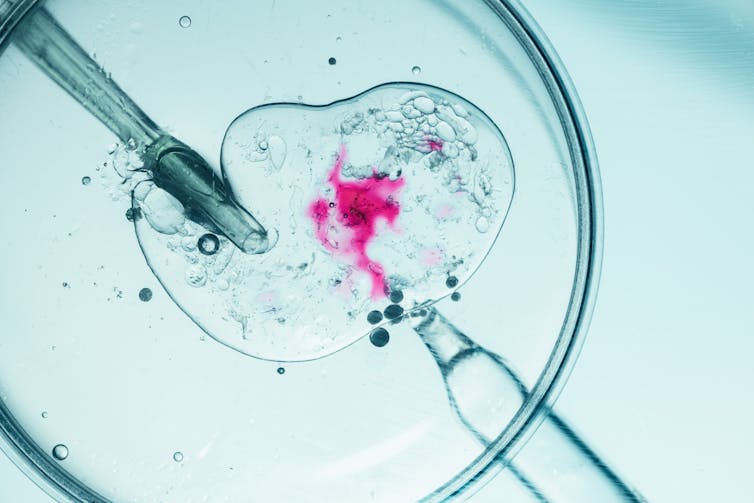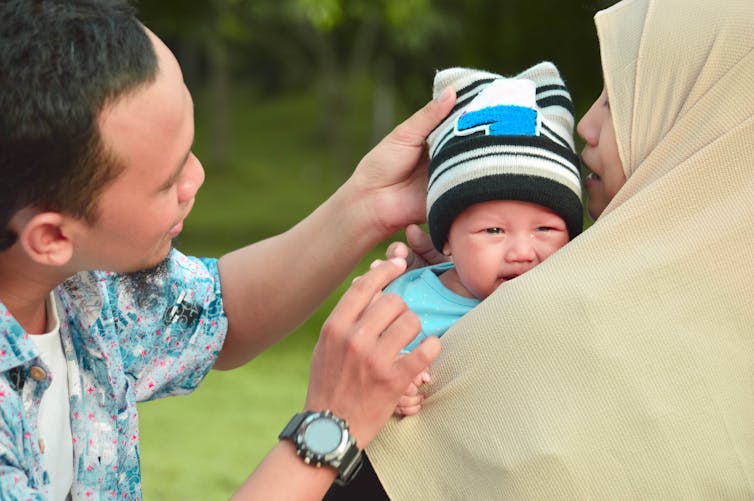For those experiencing fertility issues, cost can be a major barrier to becoming a parent.
Rebates and other public funding aim to make access to fertility health care fairer. Australia’s first public fertility clinics in Victoria, for example, were announced in 2021 to ensure “bank balance is no barrier” to fertility treatment.
But money is not the only barrier. Muslims who experience fertility issues also face specific cultural and religious barriers – but they are often overlooked.
Our recently published review of international evidence highlights how common aspects of fertility treatment – such as using donated eggs and masturbating to get a sperm sample – may be inappropriate for some Muslim patients.
So what cultural and religious barriers do Muslims face when dealing with fertility issues? And how can they be addressed?
The costs and challenges of fertility treatment
Infertility is a stressful and sometimes heartbreaking condition. It is also common. In Australia, an estimated one in nine couples require medical treatment to achieve pregnancy.
Some people experiencing fertility issues can treat them with medication or lifestyle adjustments, such as quitting tobacco and alcohol, or trying to decrease stress. Others require more intensive procedures, such as artificial insemination or in vitro fertilisation, better known as IVF.
Artificial insemination is a procedure which inserts sperm into the uterus during ovulation to achieve pregnancy. IVF involves a more invasive surgical procedure. Eggs are extracted from a woman’s ovaries and fertilised with sperm provided by a partner or donor. The resulting embryo is then inserted into the uterus.

Both artificial insemination and IVF can be unreliable procedures. In Australia, success rates for these treatments vary widely, depending on factors such as age, quality of eggs/sperm, and overall health. Many people require multiple rounds to achieve pregnancy – with private clinic costs of A$3,000 and $10,000 per round respectively.
For many who experience infertility, accessing these treatments is the last stop – and often the last hope – in a long journey.
Some treatments are incompatible with certain interpretations of Islam
When it comes to receiving appropriate fertility care, Muslim couples face specific challenges. These have not been researched in Australia.
Our research explored these barriers by analysing international evidence about Muslim communities’ access to, and experience of, fertility treatment. The studies we reviewed documented experiences in countries including Lebanon, Pakistan, the United Kingdom, New Zealand and Egypt.
We found Muslim patients face faith-specific challenges when receiving fertility care. For example, depending on specific Islamic sect and interpretation, the use of donated eggs and/or sperm in treatments can be considered impermissible.
For couples who are able to use their own eggs and sperm for IVF or artificial insemination, the challenges don’t stop there. Providing a semen sample usually requires masturbation, which some Muslims consider religiously impermissible. This can therefore leave men questioning the appropriateness of the process, and can trigger feelings of guilt and shame.
Another complexity is that, according to some interpretations of Islam, adoption is not always allowed. That may leave fertility treatments – which are lengthy, expensive and invasive – as the last option to achieve parenthood.

Fertility practitioners are sometimes unsure how to support patients whose religious, cultural or personal beliefs influence their treatment options. In Western countries, these issues can be even more pronounced.
In countries where Muslim communities are a minority, patients have reported limited understanding of the Islamic faith among some health-care practitioners. They were then insensitive to their religious concerns surrounding treatments. Without the right language supports, some practitioners may also not properly communicate what treatment entails.
Many Muslim couples are therefore navigating a complex decision: to accept treatments they view as violating their religious beliefs, or forego parenthood altogether.
Exploring solutions to nuanced problems
Muslim communities are not a monolith. In Australia, Muslims may have differing views on what types of treatments are acceptable for them in a cultural or religious sense. There is considerable diversity in interpretation, practice and language, as well as interactions between culture and faith. Improving health care for Muslim patients means understanding these nuances.
Structural issues can also play a strong role. For example, some asylum seekers in Australia – both Muslim and non-Muslim – do not have access to Medicare due to visa restrictions. This group is automatically ineligible for Victoria’s new public fertility treatments and Medicare IVF rebates.
Addressing these issues is complex, and will require more research. But there are things governments and health-care services can do to make sure Australia’s Muslim communities are not left behind. They include:
matching patients with practitioners from the same language and cultural background
embedding language supports more consistently across services
training health-care professionals to better support diverse communities
exploring alternatives to common aspects of fertility treatment. (For example, options for those unable to masturbate include surgical removal of sperm or the use of a special condom)
more research, specific to Australia, to understand Muslim patients’ experiences of fertility care.
Initiatives like public fertility clinics show a clear ambition to make treatments more accessible. But equitable distribution means taking into account barriers beyond cost alone.
Kate Hammond does not work for, consult, own shares in or receive funding from any company or organisation that would benefit from this article, and has disclosed no relevant affiliations beyond their academic appointment.
This article was originally published on The Conversation. Read the original article.







